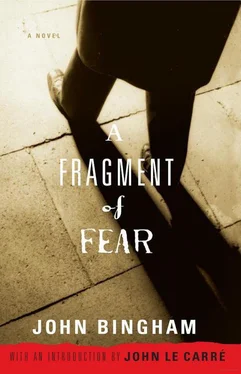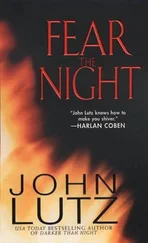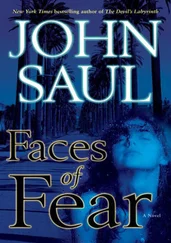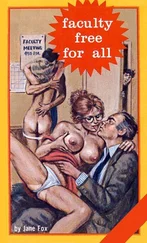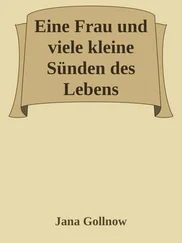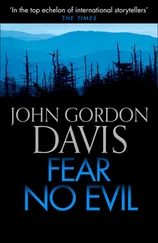John Bingham - A Fragment of Fear
Здесь есть возможность читать онлайн «John Bingham - A Fragment of Fear» весь текст электронной книги совершенно бесплатно (целиком полную версию без сокращений). В некоторых случаях можно слушать аудио, скачать через торрент в формате fb2 и присутствует краткое содержание. Жанр: Триллер, на английском языке. Описание произведения, (предисловие) а так же отзывы посетителей доступны на портале библиотеки ЛибКат.
- Название:A Fragment of Fear
- Автор:
- Жанр:
- Год:неизвестен
- ISBN:нет данных
- Рейтинг книги:3 / 5. Голосов: 1
-
Избранное:Добавить в избранное
- Отзывы:
-
Ваша оценка:
- 60
- 1
- 2
- 3
- 4
- 5
A Fragment of Fear: краткое содержание, описание и аннотация
Предлагаем к чтению аннотацию, описание, краткое содержание или предисловие (зависит от того, что написал сам автор книги «A Fragment of Fear»). Если вы не нашли необходимую информацию о книге — напишите в комментариях, мы постараемся отыскать её.
A Fragment of Fear — читать онлайн бесплатно полную книгу (весь текст) целиком
Ниже представлен текст книги, разбитый по страницам. Система сохранения места последней прочитанной страницы, позволяет с удобством читать онлайн бесплатно книгу «A Fragment of Fear», без необходимости каждый раз заново искать на чём Вы остановились. Поставьте закладку, и сможете в любой момент перейти на страницу, на которой закончили чтение.
Интервал:
Закладка:
She got abruptly to her feet. She said she was tired, and that she wanted to go home, and on the way out of the restaurant I heard her say something to the effect that one couldn’t tell when the last chance would come, one couldn’t tell at which precise point they would decide to finish the whole business off.
We drove sadly towards her home, most of the way in silence.
“It’s probably all bluff,” I said, at one point, ill-advisedly.
“Two other people thought that,” she snapped.
“Might have been coincidence,” I muttered.
“Oh, my God, oh, dear God, don’t let’s go over it again, darling! You didn’t tell me what the police said.”
I pulled the car up outside her house.
“I couldn’t produce any evidence.”
“So what?”
“I think they thought I was suffering from a persecution complex or something. They kept talking about radio sets in people’s heads, and all that nonsense. The trouble was, I mentioned the car accident. That’s what set them off. After-effects of shock, and stuff like that. That’s why I got nowhere, really. Not that I’d have probably got anywhere anyway. They weren’t Kensington officers, they were Scotland Yard types,” I added.
“What difference does that make?”
“Not much, I suppose.”
“Well, why did you mention it?”
“I just did, I mentioned it in passing, that’s all. I just said they were from Scotland Yard, not the local station. What’s wrong with that?”
“Nothing’s wrong with that.”
We sat in the car, staring straight ahead, aloof once again.
“You can see their point of view,” Juliet said quietly.
“You mean you can see their point of view.”
“Scotland Yard have got experience, darling, in all sorts of things.”
“Of course they have.”
Suddenly she turned to me and put her arms round my neck and kissed me. I felt the pent-up annoyance which had been in her melting away, and her lips, which had been cold and dry, became slowly warm and moist.
“I do love you,” she said. “And I’m sure everything is going to be all right. And don’t worry, my sweetheart. Above all, don’t worry. We’ll soon be married, and on our own, and I will look after you-so don’t do any more worrying. Promise?”
I nodded in the darkness of the car.
“Don’t worry about the woman in the train, or messages written on your typewriter, or telephone calls in the night-or anything. Try to forget them. Promise?”
I disengaged myself gently, and felt suddenly chilled and lonely.
Outside the car, the night sky was dark. It had clouded over suddenly. A few spots of rain were appearing on the windscreen. I licked my lips and said:
“Look, a few moments ago, it was you who was worrying.”
“I know, darling. I was silly. I’m better now.”
“Why?” I asked abruptly. “Why are you better? You can’t be worried sick one moment, and not the next-not without some reason.”
“I just think it will all peter out. After all, this is a civilised country, like you said, Jamie.”
“And the Lucy Dawson story?” I said as casually as I could. “What about the Lucy Dawson story?”
She didn’t answer for a few seconds. They were the sort of seconds which make a mockery of man-made methods of recording time. I stared out of the car window into the blackness of some gardens, waiting for the answer I dreaded. A gust of wind blew a wet leaf against the car window, splat, and I jerked my head back, thinking it was a moth. I hate moths.
In the end, she gave the answer I feared.
“I should go ahead with it, darling. But don’t work too hard. Promise?”
“I promise I won’t work too hard.”
I repeated her words automatically, staring at the wet leaf on the window.
“Why not chuck it for a bit, my love-come back to it with a fresh mind? Perhaps after our wedding, and after another holiday in the sun?”
“I have already told you I don’t know how to get in touch with them.”
I had spoken the words before I realised the futility of them, in view of what I knew she was thinking.
“They’ll get to know somehow,” she answered uneasily.
I turned the ignition key, preparatory to starting the engine.
“I know what you’re trying to tell me, Juliet.”
Across the road the door of her house suddenly opened. I saw in the light above the door the figure of old snuffly Stanley and two other men. One was the grey superintendent, and the other, shorter, I guessed to be the sergeant, though his back was turned to me.
“There they are,” I said. “There they are, the Scotland Yard types, who’ve got so much experience about so many things. Tidying up the loose ends, so to speak.”
I leant across her and opened the car door for her.
“Good night, darling. I should go and have a word with them. Compare notes about people who have nervous breakdowns, and think they’re being persecuted. You’ll have a lot to talk about, won’t you?”
I heard her sob as she got out of the car, without a backward glance. They were bitter and cruel words, and I regret them now.
CHAPTER 9
Ireturned to my flat, and went to sleep at about one-thirty in the morning, or possibly a little later.
Until that time I sat in an easy chair, the curtains drawn, looking at the empty grate, and finally lay in bed staring into the darkness.
Once, before I went to bed, I walked to the windows and drew the curtains aside and gazed down into the deserted street. Opposite, the dark windows of the houses stared back, disinterested, negative and lifeless.
I guessed that I had hardly moved from the windows before somebody was writing in a notebook: At ten minutes past midnight subject came to the windows and looked out. At twenty minutes past midnight subject switched off the lights in the living-room, and appeared to have retired for the night.
Did he then, having scribbled his little notes, take a few minutes off, scuttle to a gas-ring and brew himself a cup of tea or instant coffee, before settling down to another long vigil? Or did some mate, fellow worker, joint-operator, or whatever he called himself, take over? Did they work four-hour shifts, or two-hour shifts, or what?
At one stage, I was tempted to leave the flat and go for a walk. What would happen? Would somebody attempt to follow me, unnoticed in the deserted streets? And if I challenged him what innocent story would he produce?
I guessed they would make no such attempt. They must know I would do nothing worth observing at that time of night. It was they, not I, who had need of concealment in the hours of darkness.
It was not the peasant who had need to lurk in the undergrowth.
Nevertheless, at one point I was tempted to put the matter to the test. It was after a moment of panic after I had gone to bed and put the lights out.
While I had the light on, I was sure of myself and of my facts, as I had been most of the time up to the present. But in the darkness one feels alone and unsure.
It was Juliet’s volte-face which made me now feel hot and frightened. I was not afraid of attempted assassination. It was the need to know if my mind was in all truth working normally.
In a situation of apparent unreality and confusion, you need one person to lean on, one person to say, “Other people are wrong, but I know that what you say is the truth; not merely the truth as it appears to you, but the real truth. These things have happened, and you have not imagined them. You are not suffering from nerve troubles, you are mentally sound.”
I had been, first, hurt and resentful, and then, as one does with those you love, I had begun to rationalise in her favour. I told myself that she was eager to take the police point of view, because although it conjured up temporary difficulties, at least it meant that my life was not in danger. She had jumped at the lesser of the two evils, and though, like the police, she had not patted me on the head, she had, in effect, said, “There, there, just take it easy, and when we are married mummy will look after you, and nobody’s going to hurt you.”
Читать дальшеИнтервал:
Закладка:
Похожие книги на «A Fragment of Fear»
Представляем Вашему вниманию похожие книги на «A Fragment of Fear» списком для выбора. Мы отобрали схожую по названию и смыслу литературу в надежде предоставить читателям больше вариантов отыскать новые, интересные, ещё непрочитанные произведения.
Обсуждение, отзывы о книге «A Fragment of Fear» и просто собственные мнения читателей. Оставьте ваши комментарии, напишите, что Вы думаете о произведении, его смысле или главных героях. Укажите что конкретно понравилось, а что нет, и почему Вы так считаете.
